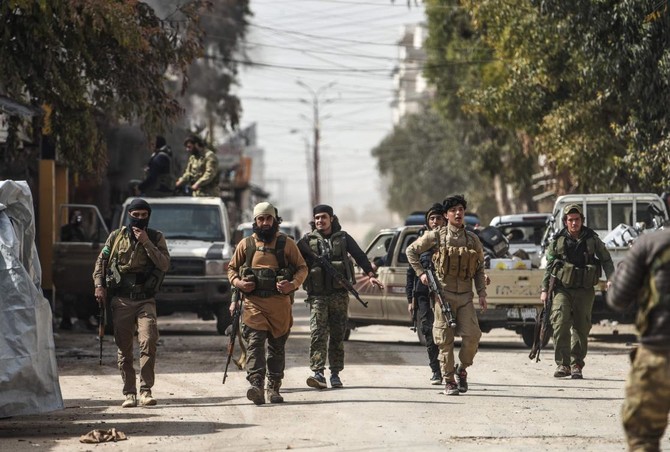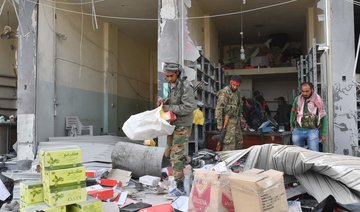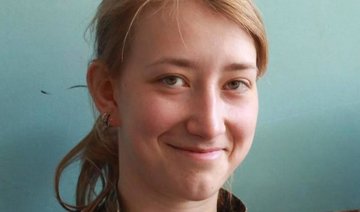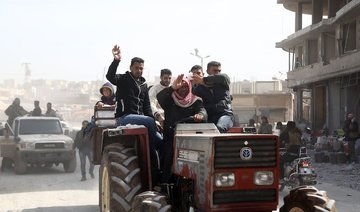ANKARA: Turkish forces will continue to press their offensive against Kurdish YPG forces along the length of Turkey’s border with Syria and — worryingly for the region’s Kurds — if necessary into northern Iraq, President Tayyip Erdogan said on Monday, threatening wider conflict in Syria’s civil war.
A day after Turkish troops swept into Afrin, the main town in a pocket of Kurdish-controlled territory in northwest Syria, Erdogan said Turkey would also target a region stretching nearly 400 km (250 miles) east to the northern Syrian town of Qamishli.
Expanding Turkey’s military campaign into the much larger Kurdish-held territory futher east would risk confronting troops of a NATO ally, the United States, that are deployed alongside a YPG-dominated force in northern Syria.
The YPG has been Washington’s main ally against Daesh in Syria, in a partnership that has infuriated Turkey which sees the Kurdish force as an extension of a militant group waging a decades-long insurgency in its own southeast.
It launched an air and ground offensive two months ago against the YPG in Afrin, a campaign it dubbed “Olive Branch.”
“By controlling Afrin city center yesterday, we have passed the most important step of the Olive Branch operation,” Erdogan told a gathering of judges and prosecutors in Ankara.
“After this, we will continue now to Manbij, Ayn Al-Arab, Tel Abyad, Ras Al-Ain and Qamishli until this corridor is fully removed,” he said, referring to a string of towns along Syria’s border region with Turkey.
Turkish authorities have described the stretch of northern Syria under Kurdish control as a “terror corridor” on the long southern border. YPG officials have said their focus is on guaranteeing legal and constitutional rights for Syrian Kurds.
Nicholas Heras, a security fellow at the Center for a New American Security, said taking Afrin was a success for Erdogan, who shrugged off international concern to press on with the operation.
“Afrin is one of the most strategic areas of northwest Syria. It is a piece of real estate that anchors Turkey’s presence for many years to come,” Heras said.
INTO IRAQ?
Turkey is also concerned about the presence in northern Iraq of militants of the Kurdistan Workers’ Party (PKK) which has waged the insurgency in Turkey since the 1980s.
The PKK has been based in Qandil mountain region near Iraq’s border with Iran, but Erdogan said a “second Qandil” was being established in Sinjar, further west.
He said Turkey had told the Iraqi government to deal with the threat. “If you are unable to handle it, we can suddenly come into Sinjar one night and clean the PKK from there. If we are friends, if we are brothers, then you will provide us with the necessary facilitations.”
Turkey’s prime minister Binali Yildirim was holding talks with the Iraqi government, Erdogan added. “However, if this issue is prolonged much longer there will be an Olive Branch there too.”
Meanwhile, a top Kurdish envoy on Monday accused the international community of being “spectators” as Turkish-led troops commit war crimes in Syria.
Khaled Issa, who represents the Kurdish rebel authority in France, accused foreign powers of abandoning the Kurds who have been allies on the ground in the fight against Daesh.
“There’s a moral responsibility for the international community in the face of an unjustified and illegal aggression,” Issa told AFP, referring to the Turkish-led offensive on the former Kurdish-held enclave of Afrin.
“What is happening in Afrin is ethnic cleansing and the great powers are spectators,” added Issa, who represents the “Rojava self-ruled Democratic Administration” which runs areas under Kurdish control in northern Syria.
Earlier on Monday government spokesman Bekir Bozdag said Turkish forces would return Afrin to its “real owners” after driving the YPG out.
“We are not permanent there (in Afrin) and we are certainly not invaders. Our goal is to hand the region back to its real owners after clearing it of terrorists,” Bozdag, who is also a deputy prime minister, told reporters.
A Syrian Kurdish official told Reuters that more than 200,000 people who had fled the Afrin offensive were without shelter, food or water in nearby areas.
“The people with cars are sleeping in the cars, the people without are sleeping under the trees with their children,” said Hevi Mustafa, a senior member of the Afrin civil authority.
The International Committee of the Red Cross (ICRC) called for greater access to the civilian population of Afrin. It said the Turkish Red Crescent aid group lacked credibility among Syrian Kurds after Turkey’s military operation.
Turkey’s emergency aid agency AFAD sent a convoy into Afrin town center on Monday and distributed Turkish Red Crescent materials including food, water and hygiene products.
The United States said it was “deeply concerned” about events in Afrin and called for the powers involved to provide access for aid organizations.
The Afrin campaign was Turkey’s second cross-border operation into Syria during its seven-year-old civil war. The first, dubbed “Euphrates Shield,” targeted Daesh and Kurdish fighters further east than Afrin.
After the completion of Euphrates Shield in early 2017, Turkey set up local systems of governance in the swathe of land captured, protected by Turkish forces.
Bozdag said Turkey now aimed to form similar systems in Afrin region, without elaborating. (Additional reporting by Tom Perry in Beirut and Stephanie Nebehay in Geneva; Writing by Dominic Evans; Editing by Andrew Roche)




























